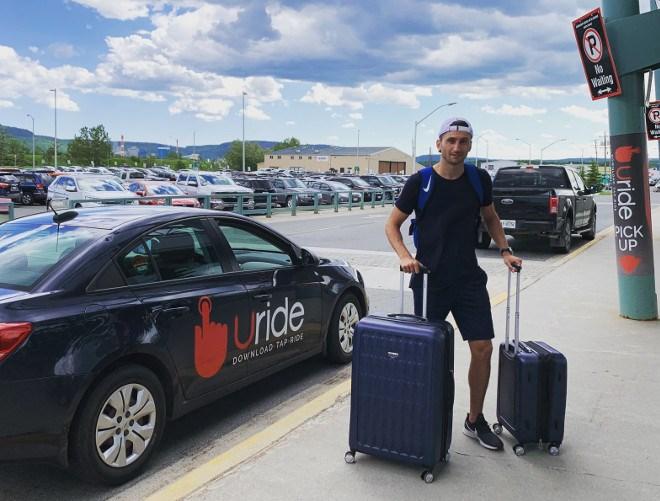From Thunder Bay to Mexico: Uride is bringing rideshare to rural communties

In a rideshare market dominated by Uber and Lyft, Thunder Bay startup Uride is making a name for itself operating where the larger companies tend not to – rural communities.
Since it was founded in 2017, Uride has launched in more than 14 locations spanning Northern Ontario, British Columbia, and Alberta. The startup is now exploring international markets with a pilot in Mexico.
Uride’s goal? To provide easy to order and safe rides in communities that tend to have more disparate and difficult to navigate transportation systems. Uride is filling a gap in regions where the likes of Uber and Lyft tend to have little to no presence.
Uride was born out of frustration from its founder Cody Ruberto, a Thunder Bay resident who realized how hard it was to get around his city. Taxis were expensive and public transportation was sparse. Ruberto noted people were waiting a long time for taxis to show up, sometimes in minus 30 degree celsius temperatures. Having also had loved ones affected by drunk driving, Ruberto figured there must be a better way.
A former professional soccer player in Europe, Ruberto started Uride after having returned to his hometown to recover from an injury. At the time, Thunder Bay bylaws did not allow for ridesharing; this was common among many municipalities as the new transportation model emerged. Uride started out with Ruberto giving personal rides and working through partnership with a local, licensed limo company.
Larger rideshare companies have typically found it harder to operate in rural areas for reasons that include lower population density and restrictive local bylaws that have been slower to change than many urban cities. Thunder Bay is a good example as any. At first, like many Canadian regions, changing the existing taxi bylaws was a hard sell. But in late 2019, Thunder Bay changed its bylaws to allow for companies like Uride to offer ridesharing. Despite these changes, neither Uber nor Lyft operate in Thunder Bay to this day. The same is true for other communities Uride has recently expanded to including Alberta’s Medicine Hat and Grande Prairie.
To support its efforts Uride raised a funding round. OCI took part in the round through its Ready 4 Market pre-seed investment fund. Through the fund, OCI co-invests with angel and other investors in early-stage Ontario-based startups in order to help those businesses scale.
Interest in Uride was instantaneous, according to Ruberto who says the app started seeing a flood of downloads after his post on Facebook that went viral. Soon, Uride was getting interest from other rural communities across Canada.

“We realized pretty early on that this can’t just be something in Thunder Bay … we’ve got to fix this problem everywhere,” says Ruberto, who sees lack of accessible transportation as a problem in smaller communities around the world.
Having expanded its presence across Canada over the past few years, Uride is taking its model global. The Thunder Bay startup is currently running a test market in a community in Mexico, and has broader ambitions to expand across Latin America.
“From there we just keep expanding, keep growing,” says Ruberto. “We want this problem eliminated from the world. We want people to have access to reliable transportation everywhere.”
Currently, Uride claims to conduct over one million rides per year, with average waiting periods for users of 10 minutes or less.
When asked how Uride makes rideshare work in rural communities where the larger companies haven’t, Ruberto narrows it down to community.
“Uride was born in a small town, so we live and breathe these smaller communities, and we just kept adapting the service until we figured out how to sort of make it work,” the Uride CEO says.
Community remains important to Uride, with one example being a ‘good deed’ foundation that the company launched during the pandemic.
Ruberto also attributed the startup’s success to the fact that it tries to create a positive work environment for its drivers. “In a lot of the cities we operate, it feels like there’s this force behind us … It’s like you have a whole community behind you.” As Uride expands it is coming face to face with the likes of Uber as the larger rideshare companies also start to slowly creep beyond urban centres. But Ruberto is confident that Uride’s approach to ridesharing that combines close community ties and fair treatment of drivers will help the startup continue to succeed.
Alicia Pereira,
Director, Communications & Strategy
Media essentials including backgrounders, logos, photos and links to OCI publications.
Stay up-to-date with the latest OCI news and events right in your inbox!




